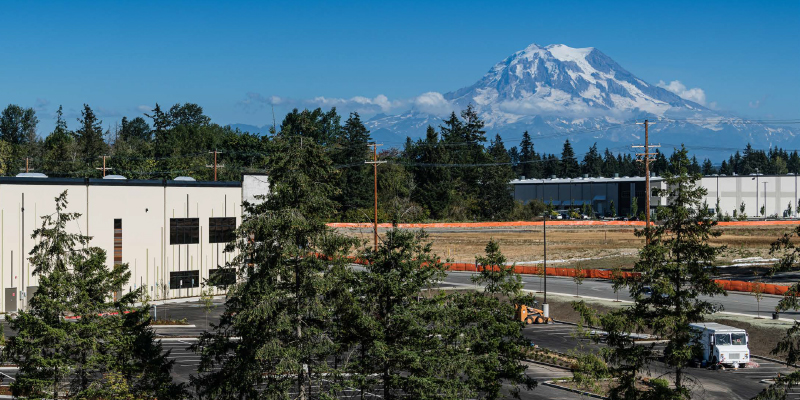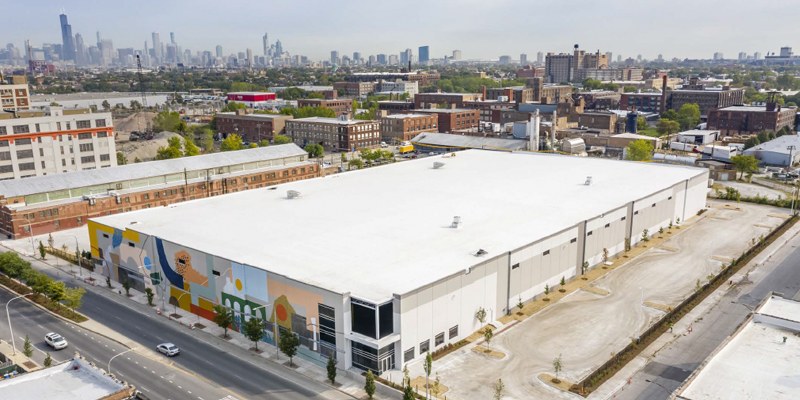Environment
Supporting the Environment for Future Generations
Logistics Property Company strives to be a leader in sustainability for industrial real estate, maximizing energy efficiency, reducing waste, and implementing material and design solutions for modern, future-proof buildings.
Net Zero Commitment: Logistics Property Company is dedicated to a sustainable future with a goal of net zero carbon emissions by 2050. Initiatives include energy efficiency improvements, embodied carbon strategies, renewable energy adoption, green leases, stakeholder alignment, and continuous improvement efforts.
Sustainable Development: We integrate sustainable practices into every stage of our development process and work towards achieving LEED-Silver or higher certifications by focusing on energy efficiency, water conservation, and the use of sustainable materials.
Renewable Energy and Electrification: We are committed to leading the industry in sustainable real estate practices, with a focus on renewable energy and electrification. Our approach is aligned with global benchmarks and industry-leading standards to include:
-
- Renewable Energy Generation and Procurement: We actively explore opportunities for on-site renewable energy solutions, such as solar roofs, to reduce our carbon footprint. We also evaluate off-site renewable options such as community solar and utility grid purchases.
- Electrification and EV Readiness: Our developments are designed with electrification in mind, including the infrastructure to support electric vehicle (EV) charging stations. Our properties are designed with the future in mind, accommodating the growing trend towards electric mobility, to ensure our tenants have access to sustainable transportation options.
Energy Efficiency and Conservation: Our properties are equipped with energy-efficient mechanical systems, building automation systems, and reflective roof materials to minimize solar heat absorption. We focus on responsible material sourcing, opting for low VOC-emitting materials, and renewable or recycled materials, such as steel made from recycled content, to reduce our environmental impact.
Embodied Carbon Reduction: We work to further reduce the environmental impact of our new developments though construction materials produced with less embedded carbon.
Climate Action and Resilience: We take a proactive approach to mitigating climate change by integrating climate risk considerations when we evaluate potential land and asset acquisitions, and we embed climate resilience into our design philosophy to anticipate and address potential environmental impacts.
Stakeholder Engagement: We recognize the importance of engaging with our stakeholders to drive sustainable change. Our annual Sustainability Report, aligned with Global Reporting Initiatives (GRI) and other frameworks, offers data and insights about our environmental performance and our progress toward our broader sustainability goals.
Our Metrics
Sustainability

of buildings use recycled building materials

of buildings use energy efficient roofs

of buildings and parking use energy efficient lighting

of buildings use low-flow bathroom fixtures

of buildings boast Low Emissivity (LE) i.e., The glass emits a low level of radiant energy

of buildings comply with local requirements for construction pollution and dust control

of buildings use high reflectance white roofs

trees planted

of buildings use high reflectance concrete

of buildings pass COMcheck i.e., Building Energy Codes Program, developed by the U.S. Department of Energy, and accepted by most municipalities for energy code compliance
CASE STUDIES

Embracing our environment, one park at a time
Amid the COVID-19 global pandemic and an extremely tight construction schedule, Logistics Property Company worked six days per week with Pierce County officials, Poe Construction, and numerous sub-contractors to accommodate a global home furnishings retailer (the tenant) on budget and ahead of schedule.
Opportunity:
Deliver a highly functional, aesthetically pleasing, environmentally sound, and location-appropriate 2.5 million square foot speculative business park into the Pacific Northwest on budget and on schedule during a global pandemic.
Focus:
Partner with NELSON, formerly known as Craft Architects, to create a bespoke design; Pierce County and Poe Construction to develop the property; and Neil Walter Company and Pacific Rim Real Estate Group, Inc. to lease the project.
Approach:
Open the conversation to better understand the regional design elements and demand uses to create a one-of-a-kind business park that will attract Fortune 500 users in the market.
Outcome:
Frederickson ONE, Building 1’s design evokes the feeling of a pacific northwest forest through various colors and designs on the precast panels.
The property earned all of the Washington state energy tax credits available, including efficient LED warehouse lighting and lighting controls; as well as all concrete truck courts.
Frederickson ONE provided 56-foot wide roads inside the park to enhance maneuverability for both trucks and automobiles within the park and its surroundings, as well as more than 2.5 times the required amount trailer parking stalls.
In addition, the site incorporates an extensive use of over 140 native trees.

Creating cleaner living, working and playing spaces
This site was the former location of the Pullman Couch facility but gained notoriety with the “Ice-Fire” of 2013. Logistics Property Company purchased the site in late 2018 and embarked on a significant environmental clean-up effort to remediate the soils. In 2019 Logistics Property Company encapsulated the site under IEPA guidance with appropriate engineered barriers and structures. Not only did Logistics Property Company improve the current land use, we also dramatically improved the environmental nature of the site.
Opportunity:
Transform an environmentally challenged vacant lot in downtown Chicago into a neighborhood-centric, modern logistics facility.
Focus:
Engage the local community to ensure optimal outcomes for our people, our community, and our environment, not only because it is the right thing to do, but also because it lowers the cost of occupancy for our tenants.
Approach:
In addition to the significant benefits brought to the community via enhanced land use, environmental clean up, and community engagement, Logistics Property Company created numerous jobs for the community. Approximately 50 new construction jobs were created during development of the property. Additionally, our tenant indicated that they would create 75 new jobs. This is a tremendous success story for a site that was environmentally challenged and sitting unused for more than five years.
Outcome:
Completed a 135,000 square foot speculative facility at 37th and Ashland in the McKinley Park neighborhood of Chicago, IL which is now the home to Technical Education Services, Inc. DBA Aviation Institute of Maintenance.
